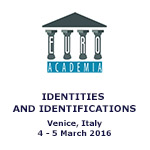Euroacademia Conferences
 Europe Inside-Out: Europe and Europeanness Exposed to Plural Observers (9th Edition) April 24 - 25, 2020
Europe Inside-Out: Europe and Europeanness Exposed to Plural Observers (9th Edition) April 24 - 25, 2020 Identities and Identifications: Politicized Uses of Collective Identities (9th Edition) June 12 - 13, 2020
Identities and Identifications: Politicized Uses of Collective Identities (9th Edition) June 12 - 13, 2020 8th Forum of Critical Studies: Asking Big Questions Again January 24 - 25, 2020
8th Forum of Critical Studies: Asking Big Questions Again January 24 - 25, 2020 Re-Inventing Eastern Europe (7th Edition) December 13 - 14, 2019
Re-Inventing Eastern Europe (7th Edition) December 13 - 14, 2019 The European Union and the Politicization of Europe (8th Edition) October 25 - 26, 2019
The European Union and the Politicization of Europe (8th Edition) October 25 - 26, 2019 Identities and Identifications: Politicized Uses of Collective Identities (8th Edition) June 28 - 29, 2019
Identities and Identifications: Politicized Uses of Collective Identities (8th Edition) June 28 - 29, 2019 The European Union and the Politicization of Europe (7th Edition) January 25 - 26, 2019
The European Union and the Politicization of Europe (7th Edition) January 25 - 26, 2019 7th Forum of Critical Studies: Asking Big Questions Again November 23 - 24, 2018
7th Forum of Critical Studies: Asking Big Questions Again November 23 - 24, 2018 Europe Inside-Out: Europe and Europeanness Exposed to Plural Observers (8th Edition) September 28 - 30, 2018
Europe Inside-Out: Europe and Europeanness Exposed to Plural Observers (8th Edition) September 28 - 30, 2018 Identities and Identifications: Politicized Uses of Collective Identities (7th Edition) June 14 - 15, 2018
Identities and Identifications: Politicized Uses of Collective Identities (7th Edition) June 14 - 15, 2018
Necrological Discourse: Necrological Identity
-
-

-
Presentation speakers
- Gale Richardson, Institute for Doctoral Studies in the Visual Arts, Portland, Maine, USA
- Download presentation
Abstract:
This paper explores the Lévinasian theory of identities enclosed within their own portraits. In struggling to draw the portrait of an adversary who abandons face-to-face discourse for a necrological discourse devoid of interlocutors, society finds itself perplexed and, perhaps, unable to calculate various factors that require inclusion within the portrait itself. Through the thinking of Emmanuel Lévinas, I will demonstrate the importance of not simply displaying the portrait of a necrological identity, which imposes a risk in depicting only a lingering insurgent, but taking the time to sketch possible portraitists and analysts who lead society to lifting the veil of a world that opposes reality and comprises only a reversed poetics of impersonal discourse. Inverted poetics do not harbor thinking, but a semblance of thinking unknown to its spector, who is chained to a past that cannot bear the present or its future, but only its end. Can society possibly exist in the face of a nihilism stemming from necrological discourse of profound uncertainties? When living people reside in the trace of history, which underscores human idealism and insulated acts only, intersubjectivity roams within a realm of a transcendence that cannot release itself without the non-mastering countenance in the identity of a just interlocutor. Therefore, I argue that lingering in the face of an impenetrable countenance of personal discourse releases a trace of the good, meaning that which provides a path out of instrumentality and into reflection by one who still returns to itself. Within the Hegelian and Lévinasian insights of this paper, I expose elements that lead a person to the trace of history, which absences history itself and presences necrological identities. I call for society to enter a place of cognizance in recognizing how to penetrate the enclosure of such identities encased within their own portraits.
-
Related Presentations

Borders Objects: Dissolution or Exacerbation of Identity
- Sabine Du Crest

Embattled Towns – Images of the Balkans in Descriptions and Travelogues of the 17th and Beginning 18th Centuries
- Elke Katharina Wittich













